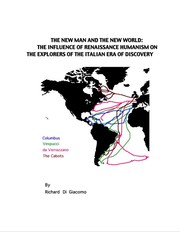Check nearby libraries
Buy this book

The collective discoveries of Christopher Columbus, Amerigo Vespucci, John and Sebastian Cabot, and Giovanni da Verrazzano constitute a distinct Italian Era of Discovery which laid the groundwork for all other voyages which followed. The Italian discoverers deserve a place alongside the well-known Humanists in the history of art, literature, philosophy, and government by virtue of their research and accomplishments. The explorers also made original contributions to the fields of science, navigation and cartography.
The world view of the Italian explorers evolved to include the concept of a new world. They had to reevaluate their cosmography and change the maps to reflect their new knowledge. The concept of a New World was equally profound as that of a new age. The most important contribution of the Italian explorers was not what they found, but the change in thinking that took place when they tried to explain their discoveries.
Check nearby libraries
Buy this book

Subjects
Columbus, Vespucci, Cabot, da Verrazano, explorers, Renaissance, Italian history, Renaissance humanism, discoverersPeople
Columbus, Vespucci, Cabot, da VerrazanoPlaces
Italy, Spain, Hispaniola, AmericaTimes
Renaissance| Edition | Availability |
|---|---|
|
1
THE NEW MAN AND THE NEW WORLD: THE INFLUENCE OF RENAISSANCE HUMANISM ON THE EXPLORERS OF THE ITALIAN ERA OF DISCOVERY
1994, Magnifico Publications
paperback
in English
0985300655 9780985300654
|
aaaa
Libraries near you:
WorldCat
|
Book Details
Table of Contents
Edition Notes
The Physical Object
ID Numbers
Links outside Open Library
Community Reviews (0)
Feedback?| October 19, 2015 | Edited by Richard Di Giacomo | Edited without comment. |
| October 19, 2015 | Created by Richard Di Giacomo | Added new book. |









